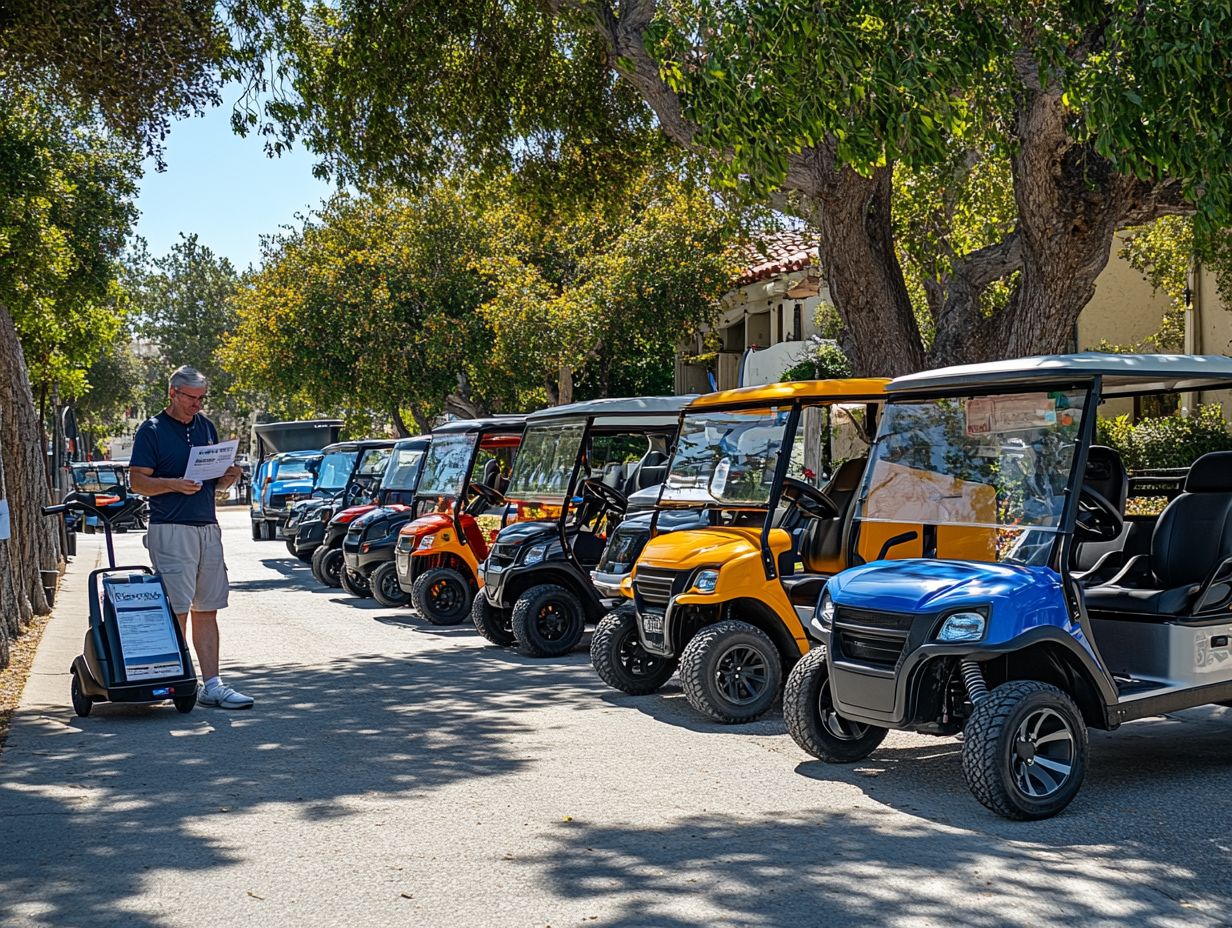Understanding Coverage for Limited Use Vehicles
Are you maximizing your protection for your limited-use vehicle? Limited-use vehicles hold a significant place in your daily life. They meet specific needs and accommodate infrequent usage.
Whether you own a classic car, an all-terrain vehicle, or a golf cart, understanding the details of limited-use vehicle coverage is essential for you as an owner. This article will walk you through definitions, types of coverage, and the key factors that influence your insurance options.
Uncover the advantages of securing the right coverage and gain valuable insights for navigating the insurance landscape with confidence. Dive in to ensure that your specialized vehicle is well-protected!
Contents
- Key Takeaways:
- What are Limited Use Vehicles?
- Types of Limited Use Vehicle Coverage
- Factors Affecting Coverage for Limited Use Vehicles
- Benefits of Limited Use Vehicle Coverage
- Tips for Obtaining Adequate Coverage
- Frequently Asked Questions about Limited Use Vehicles
- Frequently Asked Questions
- What are limited use vehicles?
- Do limited use vehicles require insurance coverage?
- What type of coverage is available for limited use vehicles?
- Can I use my limited use vehicle for regular driving?
- Are there any restrictions on when and where I can use my limited use vehicle?
- Is coverage for limited use vehicles more expensive than regular car insurance?
Key Takeaways:

- Limited-use vehicles have specific definitions and classifications. Understanding these is crucial for obtaining appropriate coverage.
- There are various coverage options available for limited-use vehicles. It’s important to explore and compare them to find the best fit for your needs.
- Factors such as vehicle type, usage, driver history, and location can affect the coverage and cost of insuring limited-use vehicles.
What are Limited Use Vehicles?
Limited-use vehicles are automobiles that serve distinct purposes and are often linked to lower annual mileage and unique usage scenarios, such as recreational vehicles or those used for occasional business activities.
These vehicles need custom auto insurance policies to fit their needs. This ensures you have the right financial protection against potential vehicle damage, liability concerns, and varying coverage limits that align with your usage patterns.
Types of Limited Use Vehicle Coverage
When you are insuring limited-use vehicles, you’ll find a range of coverage options for utility vehicles tailored to meet your specific needs and the unique risks that come with infrequent vehicle use. These include:
- Limited collision coverage
- Comprehensive protection
- Liability coverage (protects you if you’re responsible for an accident)
Each of these options ensures you have the financial safety net necessary in the event of accidents or damage, allowing you to drive with confidence, even on rare occasions when you hit the road.
Factors Affecting Coverage for Limited Use Vehicles
Several factors influence the coverage options and rates for limited-use vehicles. Key elements include the type of vehicle you own, your driving history, and your location, as well as understanding coverage for uninsured vehicles.
Each of these can significantly impact the overall cost and conditions of your insurance policy, particularly when you consider mileage and specific use categories.
Vehicle Type and Usage
The type of vehicle you choose and how you intend to use it are critical factors in selecting the right insurance coverage. Different vehicles whether it’s a recreational vehicle or a classic car come with their unique risks and coverage limits, especially when considering personal versus business use.
For example, a commercial truck used for transporting goods will likely require significantly higher liability coverage than a compact car used for personal commuting. The latter may even enjoy lower premiums, particularly if it s driven only occasionally.
Motorcycles have specialized policies designed to manage increased riding risks. This distinction impacts your premium costs and determines the necessary coverage limits to shield against potential liabilities. Understanding these nuances can help you achieve savings through precisely tailored insurance solutions.
In conclusion, take the time to evaluate your current coverage or consult a professional for help. It s essential to ensure that you have the right protection for your limited-use vehicle.
Driver History and Location

Your driving history, including your experience and past claims, along with your location, plays a significant role in determining the premiums and deductibles an insurance company sets for insuring a limited-use vehicle.
This ultimately influences the overall cost and terms of your insurance policy.
Consider the factors at play in your area, such as traffic density, accident rates, and even local weather patterns. These elements can cause fluctuating coverage options and expenses.
For example, if you navigate the bustling streets of an urban environment, you re likely to face higher premiums compared to someone in a quieter rural setting, thanks to the increased likelihood of accidents and theft.
Exhibiting safe driving habits like completing defensive driving courses or maintaining a spotless driving record can result in more favorable rates.
Choosing a vehicle equipped with advanced safety features or a reputation for lower theft rates can provide you with leverage in negotiations with insurers, ultimately enhancing your financial outlook regarding limited-use vehicle insurance.
Benefits of Limited Use Vehicle Coverage
Limited use vehicle coverage presents a wealth of benefits for you, including enhanced financial protection and the peace of mind that comes with understanding coverage for personal pleasure vehicles to safeguard your specialized vehicle.
This type of coverage also offers substantial cost savings, making it especially advantageous if you use your vehicle infrequently or seasonally.
Protection for Specialized Vehicles
Coverage tailored for specialized vehicles, like classic cars or recreational vehicles, provides you with comprehensive protection against a variety of risks, including theft, damage, and liability.
This type of insurance specifically addresses the unique needs of vehicle owners like you.
These customized policies not only safeguard your financial investment in these treasured possessions but also offer support that aligns with their distinct features and usage patterns.
For example, as a classic car owner, you’ll appreciate the benefit of agreed value coverage, which ensures your vehicle is insured for its full worth rather than its depreciated value.
Recreational vehicle insurance can encompass protections for both the vehicle and its contents, allowing you to embark on your adventures without the looming worry of unexpected incidents.
Recognizing the significance of securing specialized coverage ensures that your prized possessions remain well-protected, enabling you to fully embrace the joy of ownership.
Cost Savings for Infrequent Use
One of the significant advantages of limited use vehicle coverage for you is the potential for substantial cost savings.
With lower mileage often leading to reduced premiums, you can select higher deductibles, allowing you to tailor your insurance policy to better fit your financial situation.
Infrequent driving decreases the likelihood of accidents, which can translate into attractive insurance rates.
For instance, if you only make the trip to the grocery store on weekends, you may qualify for lower premiums by demonstrating minimal risk to insurers.
Choosing limited collision coverage can further reduce your overall costs, enabling you to pay less in monthly premiums while ensuring your vehicle is adequately protected.
This strategic choice helps you minimize expenses and frees up resources for other financial priorities, making it an intelligent option for those who prefer an economical approach to vehicle insurance.
Tips for Obtaining Adequate Coverage
Understanding your insurance policy is critical for protecting your investment! Ensure you have the right coverage for your limited-use vehicles by grasping the intricacies of insurance policies.
This includes understanding policy limits and exclusions.
Consulting with an insurance agent can provide valuable insights to help you identify the best deductible amount and coverage options that align perfectly with your unique needs.
Contact your insurance agent today to explore your options!
Understanding Policy Limits and Exclusions

Understanding the policy limits and exclusions of your insurance coverage is essential. These factors determine the level of financial protection provided by collision coverage, comprehensive coverage, and liability coverage, ultimately influencing your peace of mind in the event of an incident.
For instance, if your collision coverage limit is set lower than your vehicle’s value, you could find yourself covering the difference out of pocket in the event of a total loss. Similarly, exclusions, such as damage from natural disasters or personal use of a rental vehicle, can catch you off guard when you need support the most.
This highlights the importance of carefully reading the fine print in your policies. Doing so ensures that you are prepared for unexpected events, fostering not only financial security but also a profound sense of safety during uncertain times.
Working with an Insurance Agent
Collaborating with an insurance agent can significantly boost your chances of securing the ideal coverage for your limited use vehicle. These professionals possess the expertise to compare policies from various insurance companies, providing you with tailored options that genuinely meet your needs.
Their deep understanding of the insurance landscape enables them to navigate complex policy details, ensuring you grasp each option available to you. By leveraging their connections, they can identify discounts and craft recommendations based on your unique circumstances, including your driving habits and intended usage.
To facilitate effective communication, it s crucial to clarify your coverage goals and pose targeted questions. This enables the agent to better understand your requirements and fosters a more personalized service, ultimately leading to a policy that not only protects your investment but also grants you peace of mind.
Frequently Asked Questions about Limited Use Vehicles
Here are some common questions about limited use vehicles that can help you get started. Frequently asked questions typically revolve around the various insurance options at your disposal, including coverage for off-road vehicles, the specifics of coverage you might need to clarify, and the crucial policy details you should keep in mind to ensure you have adequate protection.
Common Insurance Questions
Common insurance questions regarding limited use vehicles typically revolve around the various coverage types available, including understanding coverage for unconventional vehicles, the nuances of the claims process, and essential policy terms that can significantly impact your overall protection.
As an owner of a limited use vehicle, you may find yourself navigating unique needs that prompt you to seek clarity on how standard auto insurance policies align or don’t with your circumstances. You might be curious about the implications of using your limited use vehicle for short jaunts versus daily commuting. It’s also crucial to grasp the differences between comprehensive, collision, and liability coverage, especially when considering coverage for specialty vehicles and which discounts could apply for vehicles not used on a regular basis.
By diving into these common queries, you can elevate your understanding of insurance, enabling yourself to make informed decisions when it comes to selecting the right coverage options.
Frequently Asked Questions
What are limited use vehicles?

Limited use vehicles are vehicles that are not intended for everyday driving, such as classic cars, antique cars, or recreational vehicles. These types of vehicles are typically used for special occasions or hobbies.
Do limited use vehicles require insurance coverage?
Yes, limited use vehicles still require insurance coverage to protect against potential accidents or damage. However, the coverage for personal vehicles may differ from that of a regular car insurance policy.
What type of coverage is available for limited use vehicles?
There are a few different options for coverage for limited use vehicles, such as liability coverage, comprehensive coverage, and collision coverage. It’s important to discuss your specific needs with an insurance provider to determine the best coverage for non-standard vehicles for your vehicle.
Don’t wait until it s too late contact your insurance agent today and ensure your limited use vehicle is well protected!
Can I use my limited use vehicle for regular driving?
No, limited use vehicles are only meant for specific purposes. If you want to drive regularly, you’ll need a different type of insurance.
Are there any restrictions on when and where I can use my limited use vehicle?
Yes, there are likely restrictions on the times and places you can drive your limited use vehicle. Some policies may only provide coverage for special interest vehicles during particular events or within certain areas. Look closely at your policy to understand the limitations.
Is coverage for limited use vehicles more expensive than regular car insurance?
It can vary based on the vehicle and coverage you select. Sometimes, insurance for limited use vehicles is cheaper because they re driven less often.
Don t miss out! Compare quotes now to snag the best deal.





